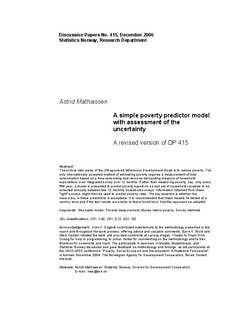A Statistical Model for Simple, Fast and Reliable Measurement of Poverty. A revised version of DP 415
Working paper

View/
Date
2005Metadata
Show full item recordCollections
- Discussion Papers [1002]
Abstract
Abstract:
The primus inter pares of the UN-approved Millennium Development Goals is to reduce poverty. The
only internationally accepted method of estimating poverty requires a measurement of total
consumption based on a time-consuming and resource-demanding measure of household
expenditure in an integrated survey over 12 months. Rather than measuring poverty, say, only every
fifth year, a model is presented to predict poverty based on a small set of household variables to be
collected annually between two 12-monthly household surveys. Information obtained from these
"light" surveys might then be used to predict poverty rates. The key question is whether the
inaccuracy in these predictions is acceptable. It is recommended that these models be tested at a
country level and if the test results are similar to those found here, that this approach be adopted.
Publisher
Statistics Norway, Research DepartmentSeries
Discussion Papers;No. 415Related items
Showing items related by title, author, creator and subject.
-
The impacts of alternative policy instruments on environmental performance. A firm level study of temporary and persistent effects
Bye, Brita; Klemetsen, Marit Elisabeth (Discussion papers;788, Working paper, 2014-10)We study the effects of various environmental regulations on environmental performance measured as emission intensity. Moreover, we aim to test whether any such effects are persistent or only temporary. Conventional theory ... -
The welfare effects of carbon policies: grandfathered quotas versus differentiated taxes
Bye, Brita; Nyborg, Karine (Discussion Papers;No. 261, Working paper, 1999)Recently, it has been demonstrated that pre-existing distortionary taxes can substantially increase the costs of market-based instruments which do not raise revenue, such as non-auctioned emissions quotas. Revenue-raising ... -
Labour market rigidities and environmental tax reforms : welfare effects of different regimes
Bye, Brita (Discussion Papers;No. 242, Working paper, 1998)The working of the labour market is important for the total welfare effects of tax reforms. This paper analyses, by using a computable general equilibrium model for the Norwegian economy, how different assumptions about ...